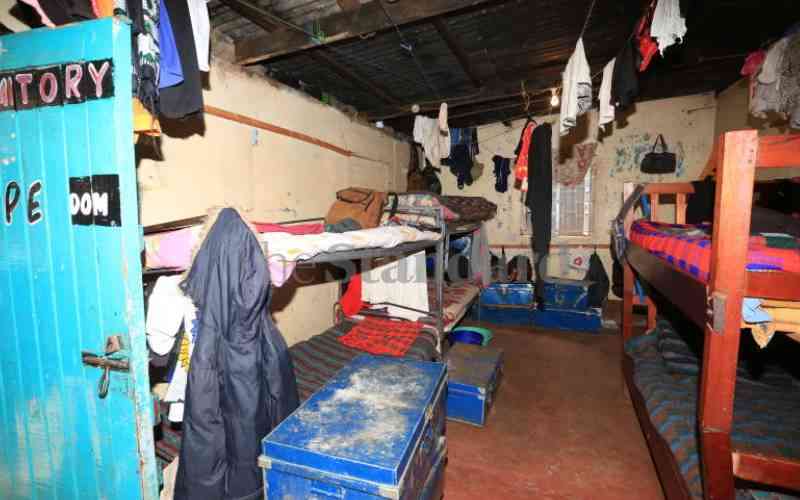Contrary to a long held view that many Kenyan cultures and traditions favour boys and that they (the boys) always have it nice and easy, the stark reality is that these young men are often neglected, their cries ignored and they continue to suffer in silence.
To put it bluntly, it would appear like Kenyans dislike boys and would not mind even if they were all herded into trucks and dumped in the Indian Ocean or someplace where they will not pollute the environment.
As a matter of fact, in Kenya, the boy-child is nearly by law supposed to suffer, and should never complain because Kenyan men have had it so good for ages while women, and specifically the girl-child, have been denied their rights.
Where that thought came from, I have no idea, but the other day, a local television news channel reported the story of some young women being forced into marriage because they were pregnant. Forced, as it were might even be the wrong word to use in this case considering the punishment was not meant for these young women — school girls to be precise — but it is the irresponsible men getting punished by being forced to marry them.
Of course we can write that the school girls were victims of sexual offences and the offenders should have received severe punishment like jail terms or more, but there was a minor problem, in all senses of the word minor.
The irresponsible men being forced to get married to the pregnant school girls are actually young men — school boys to be precise — and are dependents who cannot take care of their wives’ basic material needs and do not even know how to treat them.
Looked at differently, the school girls and the offenders are victims of a flawed education system and a prim and proper, righteous and pious society in which sex is a taboo subject that should not be talked about because talking about it will encourage schoolchildren to engage in it.
It is a moral society that hides behind traditions or culture, yeah, an ignorant society that gets offended when it is proposed that the youth should be helped to understand their bodies or be given the right information which they can use to protect themselves from unwanted or even accidental pregnancies.
Based on that news item, it is easy to conclude that the girl child in Kenya is in danger and needs a lot of protection.
As such, it will not be surprising when some non-State organisation worms its way into the coffers of a State body and receives funds to use in the protection or uplifting of these school girls — categorised under the suffering girl child — and no one will bother about the boys who in essence are also victims.
For as long as Kenya has been in existence, there has always been a hue and cry about the suffering girl-child, and numerous State-sponsored programmes have been mooted to help her. Non-State bodies, community based organisations and nearly every other conceivable body has plans, programmes, projects, initiatives and interventions aimed at promoting the rights of the girl child; to protect her, to provide her with life skills, to save her, to educate her — while no one cares much about the boy-child.
Every now and then, Kenyans are bombarded with headlines screaming about girls, and statistics are spewed forth about their school dropout rates, how many of them live in difficult situations, how they suffer for their families. Subsequently, foreign bodies and State entities put money into projects that will help them overcome the hardships.
Year in, year out, successive governments make provisions for the girl-child, and non-State bodies spring up every other day with a sole agenda of helping her, yet, we keep on hearing about how she is still suffering, how she is subjugated — about all the hardships she has to put up with.
As a matter of fact, girl-child related programmes and initiatives are just conduits which non-State bodies use to con international bodies or siphon funds from State coffers.
Stay informed. Subscribe to our newsletter
The girl-child has become an excuse that many individuals and their briefcase bodies use to enrich themselves; meaning thereby that a lot of money that could have been put to better use or put in programmes that help the boy-child, gets stolen.
In the short term, these numerous programmes might sound like very good ideas which make young women stronger and give them the will to survive, to fight for their rights and to be passionate about their roles in society.
But in the long term, they are detrimental to the survival of the girl-child who grows up knowing that somewhere in the dark Kenyan horizon, she is to get assistance, and that she is supposed to be weak, vulnerable and in a strange twist of logic, see herself as a victim of an unjust patriarchal society.
There is no denying that Kenya has many women of subcutaneous substance who deserve all that they have because they have worked hard for it, but all these programmes and the attendant rhetoric about the suffering girl-child are backfiring by creating a generation of indolent young women who think men were created to do their bidding.
Yeah, a generation of young women who do not want to lift a finger to even do their own nails; ill-educated brats who think feminism is another term for mistreating boys and/or disrespecting men — the non-reasoning type that complain about “all men,” when they had an altercation with just one person: their father.
It is easy to complain about men, but as long as the boy-child is neglected, looked down upon, mistreated, uneducated and not given life skills, the number of bad men will only increase — then Kenyan women will have a good reason to complain about all men.
 The Standard Group Plc is a
multi-media organization with investments in media platforms spanning newspaper
print operations, television, radio broadcasting, digital and online services. The
Standard Group is recognized as a leading multi-media house in Kenya with a key
influence in matters of national and international interest.
The Standard Group Plc is a
multi-media organization with investments in media platforms spanning newspaper
print operations, television, radio broadcasting, digital and online services. The
Standard Group is recognized as a leading multi-media house in Kenya with a key
influence in matters of national and international interest.
 The Standard Group Plc is a
multi-media organization with investments in media platforms spanning newspaper
print operations, television, radio broadcasting, digital and online services. The
Standard Group is recognized as a leading multi-media house in Kenya with a key
influence in matters of national and international interest.
The Standard Group Plc is a
multi-media organization with investments in media platforms spanning newspaper
print operations, television, radio broadcasting, digital and online services. The
Standard Group is recognized as a leading multi-media house in Kenya with a key
influence in matters of national and international interest.








